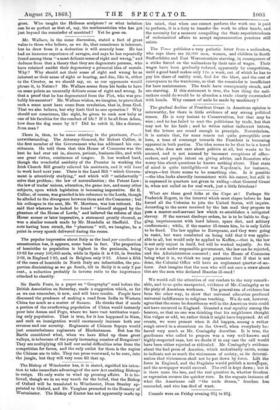We would call the attention of our readers to the
very remark- able, and to us quite unexpected, evidence of Mr. Coningsby as to the piety of American workmen. The general run of evidence has been the other way, to show that universal education produced universal indifference to religious teaching. We do not, however, agree that the scene he describes so well in the American train could not have occurred in England. Granted a real equality among the hearers, so that no one was thinking that his neighbours thought him vulgar or odd, we rather think it might have happened. At all events, we were present when it did happen, among a rather rough crowd in a steamboat on the Orwell, when everybody be- haved very much as Mr. Coningsby describes. It is true, the gentleman who called to prayers was a very well-known and highly-respected man, but we doubt if in any case the call would have been either rejected or ridiculed. Mr. Coningsby's evidence about the bad press of America, which undoubtedly exists, seems to indicate not so much the viciousness of society, as its determi- nation that viciousness shall not be put down by force. Lift the force in England, and the Dugdales would publish a newspaper, and the newspaper would succeed. The evil is kept down ; but it is there none the less, and the real question is, whether freedom or repression secures the quicker cure. In the cognate instance of what the Americans call "the nude drama," freedom has succeeded, and vice has died of want.






























 Previous page
Previous page